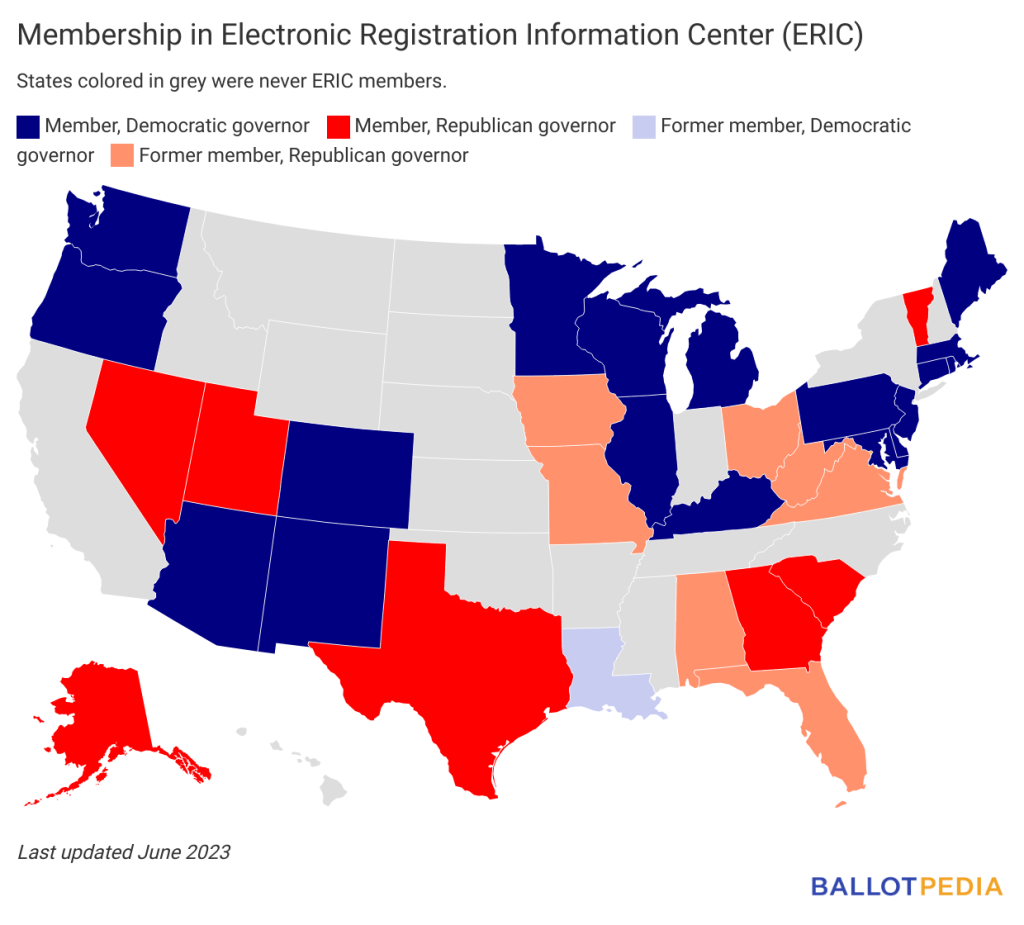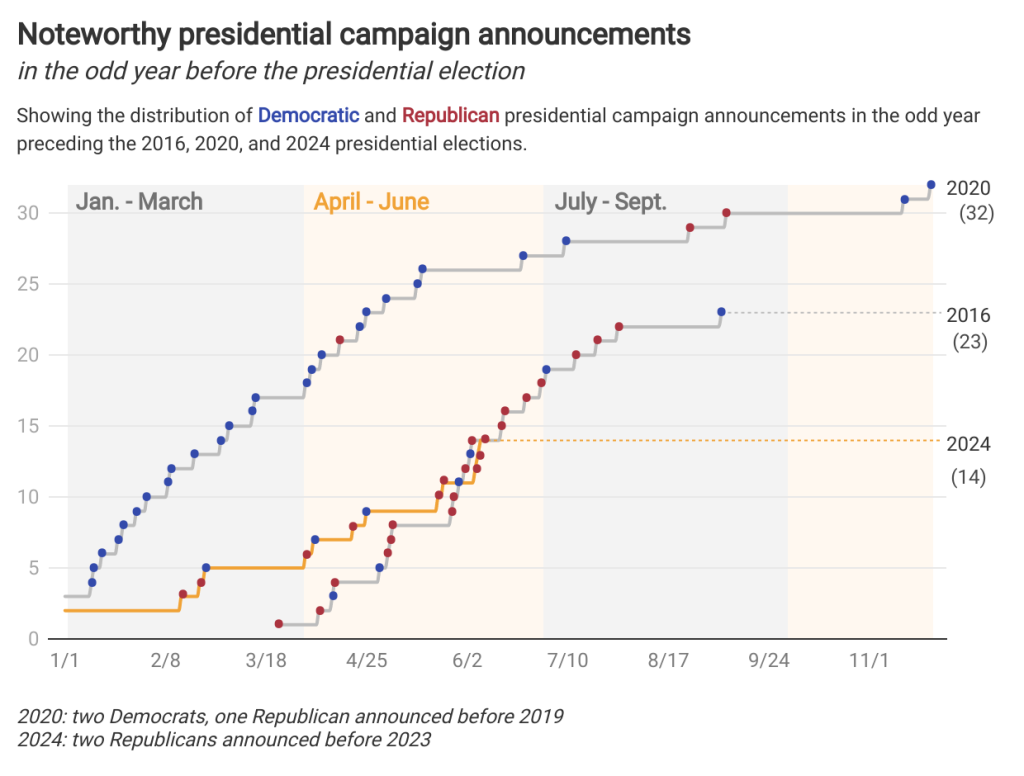Welcome to the Friday, June 9, Brew.
Here’s what’s in store for you as you start your day:
- Eight states have withdrawn from the Electronic Registration Information Center since 2022; Texas is poised to become the ninth
- Burgum, Christie, and Pence announce presidential campaigns
- #FridayTrivia: In the 14 states and D.C. where marijuana legalization was on the ballot and passed, what was the average yes vote?
Eight states have withdrawn from the Electronic Registration Information Center (ERIC) since 2022; Texas is poised to become the ninth
On May 29, Texas lawmakers sent Senate Bill 1070 (SB 1070) to Gov. Greg Abbot (R), positioning the state to become the eighth to withdraw from the Electronic Registration Information Center (ERIC) this year, and the ninth since 2022.
In case you have not been following the story, let’s dive into the background.
A group of chief election officials in Colorado, Delaware, Maryland, Nevada, Utah, Virginia, and Washington established ERIC in 2012 with financial assistance from the Pew Charitable Trusts. A multi-state voter list maintenance nonprofit, ERIC says its mission is “to help states improve the accuracy of America’s voter rolls, increase access to voter registration for all eligible citizens, reduce election costs, and increase efficiencies in elections.” Because states run elections, there is no national list of voters. States that join ERIC agree to share their voter registration and licensing and identification data from motor vehicle departments every 60 days. ERIC compiles this data and issues a series of voter list maintenance reports. The organization also requires member states to contact eligible voters with voting registration information.
At its height, 33 states were participating members in ERIC. The country’s four most populous states broke in different directions when it came to joining the organization—California and New York never joined While Florida and Texas did (the California Assembly is currently considering Assembly Bill 1206, which would require the secretary of state to apply for membership in ERIC).
On July 13, 2022, Louisiana became the first state to officially resign its membership in ERIC, after previously suspending its participation in January.
Since then, the following seven states have also withdrawn:
- Alabama
- Florida
- Iowa
- Ohio
- Missouri
- Virginia
- West Virginia

With the exception of Louisiana, which has a Democratic governor, every state that has withdrawn from ERIC has a Republican governor.
Critics of ERIC include officials like Ohio Secretary of State Frank LaRose (R), who once defended the organization but now say it needs to enact reforms related to governance, data security, and member state requirements. LaRose said ERIC’s bylaws should be changed to no longer allow two non-voting members who are not government employees on the board of directors: “ERIC’s membership should only consist of member states, who answer to the voters and taxpayers they represent.” Objecting to a requirement that members regularly contact eligible but unregistered voters, LaRose also said members should be able to decide for themselves how best to use ERIC’s data.
Ohio’s withdrawal from ERIC is effective June 16.
Susan Beals, Virginia’s commissioner of elections, said that although Virginia was a founding member of the organization, “ERIC’s mandate has expanded beyond that of its initial intent—to improve the accuracy of voter rolls. We will pursue other information arrangements with our neighboring states and look to other opportunities to partner with states in an apolitical fashion.”
Not all Republican secretaries of state have opposed ERIC, however. Georgia Secretary of State Brad Raffensperger (R), for example, said, “states that prioritize best practices and actual election integrity over politics are going to stay in ERIC and have clearer and more accurate voter rolls than those that choose to leave.”
Michigan Secretary of State Jocelyn Benson (D) said, “This entire controversy is fueled by easily debunked misinformation and a newfound desire by some member states wanting to opt out of sending eligible citizens information on how to register to vote.”
In an open letter responding to criticisms, ERIC Executive Director Shane Hamlin said, “We analyze voter registration and motor vehicle department data, provided by our members through secure channels, along with official federal death data and change of address data, in order to provide our members with various reports. They use these reports to update their voter rolls, remove ineligible voters, investigate potential illegal voting, or provide voter registration information to individuals who may be eligible to vote.”
The Texas Republican Party, which supported the state’s withdrawal from ERIC, said, “The ERIC membership agreement collects an extensive amount of personally identifiable information and data related to elections going far beyond the requirements of our Interstate Crosscheck Program.” State Sen. Bryan Hughes (R), who cosponsored the bill, said, “Now, there is no evidence that ERIC is doing anything to Texas voter rolls. But we do know that the people running ERIC do not share our worldview.” State Rep. Chris Turner (D) said: “I don’t understand why we have this bill before us, particularly when we know the data shows that ERIC has helped Texas identify duplicate registrations, and that’s exactly what we should be trying to do.”
Texas isn’t the first state in which the legislature has passed a bill that would affect membership in ERIC. On May 15, the Arizona Legislature sent Senate Bill 1135 (SB 1135) to Gov. Katie Hobbs (D), which Hobbs vetoed on May 26. The bill included provisions that would have effectively withdrawn Arizona from ERIC.
In the eight states that have withdrawn from ERIC so far, the chief election official made the decision without legislative input.
So far this year, we’ve tracked 122 bills related to voter list maintenance. That figure is slightly less than the 159 introduced and tracked in 2022. Of those 122 bills, 10 have been enacted and two have been vetoed (including Arizona’s SB 1135). Click here to use our Legislation Tracker to follow bills in your state.
Click below to learn more about ERIC.
Keep reading
Burgum, Christie, and Pence announce their presidential campaigns
Let’s check in on the race to the White House, which is becoming ever more packed with candidates. Over the last week, three new noteworthy candidates announced 2024 presidential campaigns. Former New Jersey Gov. Chris Christie (R) officially announced his candidacy on June 6, while former Vice President Mike Pence (R) and North Dakota Gov. Doug Burgum (R) officially announced their candidacies on June 7.
There are now three noteworthy Democrats and 11 noteworthy Republicans running for president. Below is a summary of each candidate’s campaign activity from May 31 to June 7.
- Joe Biden (D) commented on his signing of the Fiscal Responsibility Act of 2023 on June 4. The Democratic National Committee and Building Back Together, a group supporting Biden, released ads highlighting his handling of the negotiations.
- Robert F. Kennedy Jr. (D) participated alongside Elon Musk and other guests in a live-streamed conversation on Twitter on June 5. Kennedy also campaigned in New Hampshire on June 1, where he spoke before the New Hampshire Senate, and visited Yuma, Arizona, on June 7.
- Marianne Williamson (D) wrote an op-ed for Newsweek titled “Debate Us, Mr. President,” on May 31.
- Doug Burgum (R) announced his presidential campaign on June 7 at an event in Fargo, North Dakota.
- Chris Christie (R) announced his presidential campaign on June 6 at an event at the New Hampshire Institute of Politics in Goffstown, New Hampshire.
- Ron DeSantis (R) campaigned in South Carolina on June 2 and visited Sierra Vista, Arizona, on June 7. Former Nevada Attorney General Adam Laxalt endorsed DeSantis on June 6.
- Nikki Haley (R) participated in a CNN Town Hall on June 4. At the event, Haley commented on issues including the war in Ukraine, Medicare, and social security. Haley also spoke at the Connecticut Republican Party’s Prescott Bush Awards Dinner in Stamford, Connecticut, on May 31.
- Asa Hutchinson (R) participated in a televised WMUR town hall on May 31, and campaigned in Indianola, Iowa, on June 2.
- Mike Pence (R) announced his candidacy on June 7 at an event in Ankeny, Iowa.
- Vivek Ramaswamy (R) campaigned in New Hampshire on June 1 and 2, and attended an event in Garrett County, Maryland, on June 5. On June 4, Ramaswamy commented on the war on Ukraine during an interview with ABC’s Martha Raddatz.
- Tim Scott (R) wrote an op-ed for Fox News titled “America is a land of opportunity, not a land of oppression,” published on June 1. On June 2, Scott campaigned in Council Bluffs, Iowa, and on June 7, he released a new ad set to air in Iowa. Also, on May 31, Scott said he would vote against the Fiscal Responsibility Act of 2023.
- Donald Trump (R) released a policy memo on drug policy on June 1. That same day, he campaigned in Urbandale, Des Moines, and Grimes, Iowa, and participated in a televised Fox News town hall. On June 6, Trump released an ad criticizing Biden and Democratic members of Congress, among other government officials. On June 7, Politico reported that 50 members of the West Virginia Legislature signed a letter endorsing Trump.
In addition to the events above, DeSantis, Larry Elder (R), Haley, Hutchinson, Pence, Ramaswamy, and Scott attended a Roast and Ride event organized by Sen. Joni Ernst (R) in Des Moines, Iowa, on June 3.

At this point in the 2020 cycle, 26 noteworthy candidates were running for president—24 Democrats and two Republicans. In the 2016 election, 14 noteworthy candidates had announced their campaigns as of June 7.
Learn more about the 2024 presidential race at the link below.
#FridayTrivia: In the 14 states and D.C. where marijuana legalization was on the ballot and passed, what was the average yes vote?
In the Wednesday Brew, we brought you a story about how voters in Florida could vote on legalizing marijuana in 2024—but only if the measure gets through a state supreme court review.
Currently, 23 states and Washington D.C. have legalized the possession and personal use of marijuana for recreational purposes. This includes 16 states with Democratic trifectas, two with Republican trifectas, and five with divided governments. In 14 of those states and D.C., voters decided legalization measures at the ballot box.
What was the average yes vote in those 14 states and D.C.?

